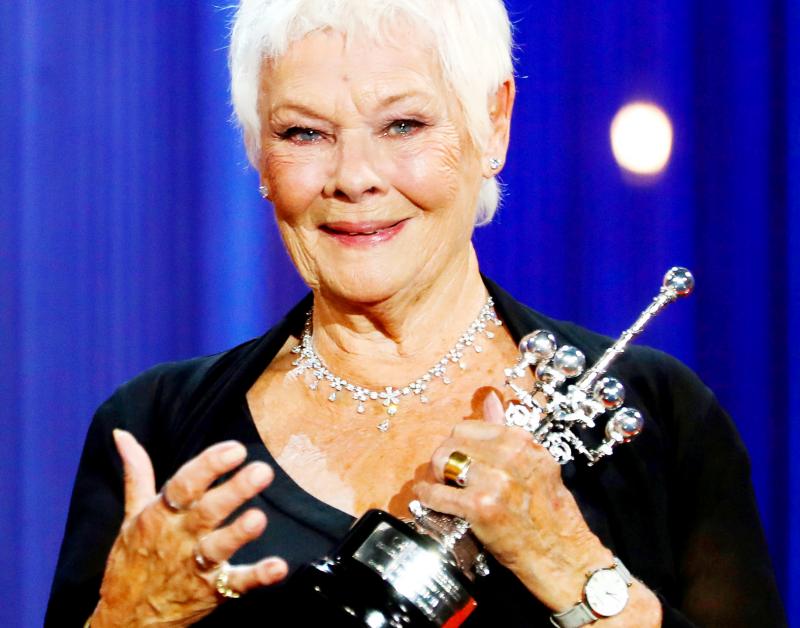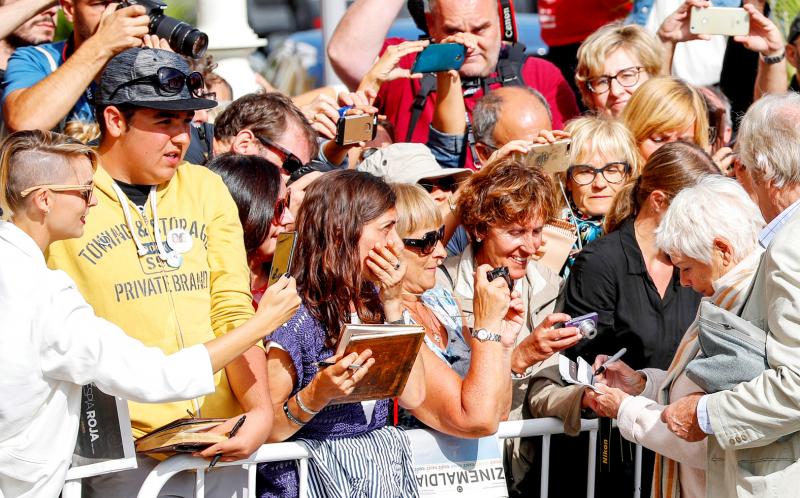You can’t call Judi Dench lazy when it comes to contributing to society, but she’s been particularly dedicated to boosting morale of late. Who knows, perhaps she felt pressured to make up for her turn in the unhinged Cats film, where her feline character horrified viewers by appearing to wear a coat made of its own fur.
Dench has provided vital comic relief during this time of crisis, predominantly with silly social media clips — a Twitter video of her wearing a novelty dog hat with pop-up ears in which she instructs us to “keep laughing” racked up 5.4 million views. Now she has supplied a far meatier pick-me-up by becoming, at 85, British Vogue’s oldest cover star.
On the front page of the magazine’s June issue, the Oscar-winner rocks a floral Dolce & Gabbana coat. But her outfit is far from the most striking thing about the shot. Instead, what immediately hits you are her jaunty pixie haircut and sparkling blue eyes. And yes, her wrinkled skin doesn’t go unnoticed, either — unsurprisingly, given that fashion magazines, like the rest of society, aren’t exactly known for celebrating getting older.

Photo: EPA-EFE
There are several heartening messages to take from the cover. First off, could it be that the age-phobic fashion world has finally realized that women don’t morph into unsightly crones the moment they hit 40? (And that readers won’t desert magazines when they choose to showcase them.)
Admittedly, Dench is far from an everywoman. Her megawatt star power means she can, to an extent, escape the prejudices usually directed at older people. But seeing as publisher CondeNast says the average Vogue reader is 39 for print and 44 for online, there’s a chance that this issue will enable readers to feel more represented age-wise. In turn, this could encourage the magazine to feature more older stars in the future.
But the cover is also cheering for a bazillion more reasons. At 85, Dench is in one of the highest risk groups for Covid-19; as her issue hits the newsstands, talk continues of an extended lockdown for the over-70s . In other words, we’re all too aware of the potential physical consequences of getting older at present. In this context, shots of her grinning mischievously feel defiant. A bit like Captain Tom Moore , except in silk. It’s for this same reason that her lighthearted social media videos have been such big hits. (Along with the dog hat offering, Dench did a TikTok dance with her grandson and went viral after teaming up with Gyles Brandreth for a rendition of The Owl and the Pussy-cat.)

Photo: EPA-EFE
Moreover, while the interview likens Dench to a “cultural tea cosy,” the conversation shows she’s much sharper than that. Take her pleasingly blunt response to her outfit in Cats. She describes her cloak as: “Like five foxes fucking on my back.”
Society has a tendency to patronize older people by pretending they are universally benign. Aside from giving a glimpse into how she operates on set, Dench’s confession that she can “be very difficult if somebody takes me for granted” hints that, well, don’t try that attitude with her.
Besides, while we continue to fetishize youth — just think of the tributes to how the BBC’s Normal People depicts the intensity of being young — a “pin sharp” depiction, went a recent Guardian editorial, of “the unforgettable intensity of first love and lust — Dench reminds us that there’s plenty of inspiration and vivacity to be found among the senior generation, too.
The psychotherapist Esther Perel recently spoke in a Financial Times podcast about how grandparents discussing difficult periods in their lives with younger relatives may be a way of passing resilience down the generations. I was reminded of this while watching the video that runs with Dench’s interview online, in which younger stars grill her for professional advice. Yes, she’s largely discussing acting rather than anything darker, but it still confirms that with age comes wisdom.
Age is not just a number; Dench is blunt about the physical challenges it brings.
“It’s terrible to be so dependent on people,” she says of having to give up driving. Even so, she’s fiercely resistant to the expectations that come with getting older. Take her attitude to retirement, for instance.
“Rage, rage against the dying of the light,” is how she sums it up, quoting Dylan Thomas.
All in all, you’re left thinking that while you can’t fight ageing’s physical reality, it is possible to push back against the prejudice that accompanies it.
Indeed, Dench’s cover will inevitably be branded age-defying, but it’s more accurate to say it defies our expectations of what getting older involves. Both her Vogue and social media stardom prove that vitality exists far beyond youth, and that it’s frankly ludicrous that society sidelines older women, given their style, wit and energy.
Honestly, Dench has been so busy imparting all sorts of key lessons of late, I’d suggest she give herself a break and retire. But, of course, she’d never agree to that.

Most heroes are remembered for the battles they fought. Taiwan’s Black Bat Squadron is remembered for flying into Chinese airspace 838 times between 1953 and 1967, and for the 148 men whose sacrifice bought the intelligence that kept Taiwan secure. Two-thirds of the squadron died carrying out missions most people wouldn’t learn about for another 40 years. The squadron lost 15 aircraft and 148 crew members over those 14 years, making it the deadliest unit in Taiwan’s military history by casualty rate. They flew at night, often at low altitudes, straight into some of the most heavily defended airspace in Asia.

Beijing’s ironic, abusive tantrums aimed at Japan since Japanese Prime Minister Sanae Takaichi publicly stated that a Taiwan contingency would be an existential crisis for Japan, have revealed for all the world to see that the People’s Republic of China (PRC) lusts after Okinawa. We all owe Takaichi a debt of thanks for getting the PRC to make that public. The PRC and its netizens, taking their cue from the Chinese Communist Party (CCP), are presenting Okinawa by mirroring the claims about Taiwan. Official PRC propaganda organs began to wax lyrical about Okinawa’s “unsettled status” beginning last month. A Global

Taiwan’s democracy is at risk. Be very alarmed. This is not a drill. The current constitutional crisis progressed slowly, then suddenly. Political tensions, partisan hostility and emotions are all running high right when cool heads and calm negotiation are most needed. Oxford defines brinkmanship as: “The art or practice of pursuing a dangerous policy to the limits of safety before stopping, especially in politics.” It says the term comes from a quote from a 1956 Cold War interview with then-American Secretary of State John Foster Dulles, when he said: ‘The ability to get to the verge without getting into the war is

Like much in the world today, theater has experienced major disruptions over the six years since COVID-19. The pandemic, the war in Ukraine and social media have created a new normal of geopolitical and information uncertainty, and the performing arts are not immune to these effects. “Ten years ago people wanted to come to the theater to engage with important issues, but now the Internet allows them to engage with those issues powerfully and immediately,” said Faith Tan, programming director of the Esplanade in Singapore, speaking last week in Japan. “One reaction to unpredictability has been a renewed emphasis on